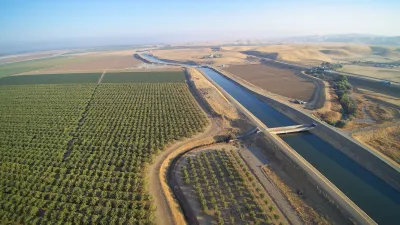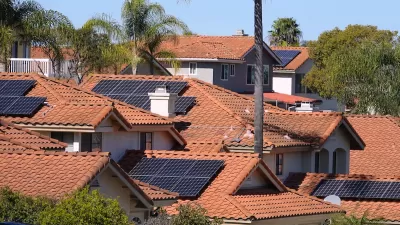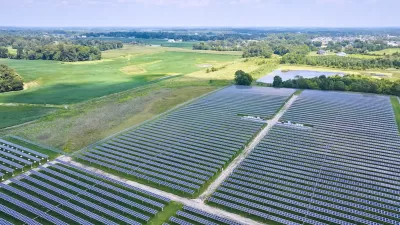Government incentives have long sought to boost the viability of renewable energy sources. Though it accounts for less than a quarter of 1 percent of America's power generation, utility companies say its time to stop subsidizing solar.
"For years, power companies have watched warily as solar panels have sprouted across the nation’s rooftops. Now, in almost panicked tones, they are fighting hard to slow the spread," reports Diane Cardwell. "Alarmed by what they say has become an existential threat to their business, utility companies are moving to roll back government incentives aimed at promoting solar energy and other renewable sources of power. At stake, the companies say, is nothing less than the future of the American electricity industry."
"The battle is playing out among energy executives, lawmakers and regulators across the country," she explains. "Nowhere, though, is the battle more heated than in California, home to the nation’s largest solar market and some of the most aggressive subsidies. The outcome has the potential to set the course for solar and other renewable energies for decades to come."
Of note: the recent U.S. energy chart released by Lawrence Livermore National Laboratory indicates that "solar energy production in the U.S. jumped by 49 percent last year, and wind energy by more than 16 percent," reports John Upton in Grist.
FULL STORY: On Rooftops, a Rival for Utilities

Alabama: Trump Terminates Settlements for Black Communities Harmed By Raw Sewage
Trump deemed the landmark civil rights agreement “illegal DEI and environmental justice policy.”

Planetizen Federal Action Tracker
A weekly monitor of how Trump’s orders and actions are impacting planners and planning in America.

The 120 Year Old Tiny Home Villages That Sheltered San Francisco’s Earthquake Refugees
More than a century ago, San Francisco mobilized to house thousands of residents displaced by the 1906 earthquake. Could their strategy offer a model for the present?

In Both Crashes and Crime, Public Transportation is Far Safer than Driving
Contrary to popular assumptions, public transportation has far lower crash and crime rates than automobile travel. For safer communities, improve and encourage transit travel.

Report: Zoning Reforms Should Complement Nashville’s Ambitious Transit Plan
Without reform, restrictive zoning codes will limit the impact of the city’s planned transit expansion and could exclude some of the residents who depend on transit the most.

Judge Orders Release of Frozen IRA, IIJA Funding
The decision is a victory for environmental groups who charged that freezing funds for critical infrastructure and disaster response programs caused “real and irreparable harm” to communities.
Urban Design for Planners 1: Software Tools
This six-course series explores essential urban design concepts using open source software and equips planners with the tools they need to participate fully in the urban design process.
Planning for Universal Design
Learn the tools for implementing Universal Design in planning regulations.
Clanton & Associates, Inc.
Jessamine County Fiscal Court
Institute for Housing and Urban Development Studies (IHS)
City of Grandview
Harvard GSD Executive Education
Toledo-Lucas County Plan Commissions
Salt Lake City
NYU Wagner Graduate School of Public Service





























